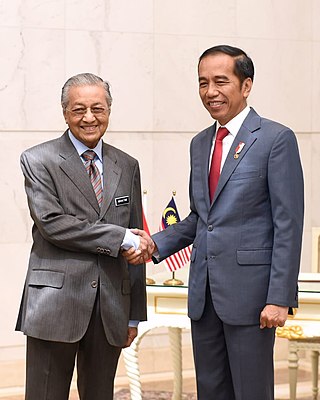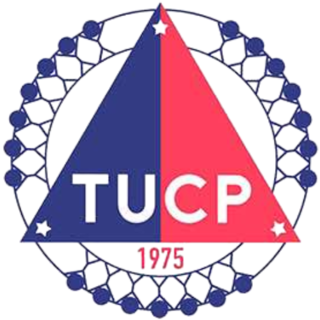
Since independence, Indonesian foreign relations have adhered to a "free and active" foreign policy, seeking to play a role in regional affairs commensurate with its size and location but avoiding involvement in conflicts among major powers. During the Presidency of Sukarno, Indonesia's Foreign Relations were marked by engagement with other newly independent nations in Asia and Africa, as exemplified by the Bandung Conference, the subsequent foundation of the Non-Aligned Movement and a confrontational attitude towards Western powers, justified by a belief in the CONEFO and opposition to what Sukarno termed as NEKOLIM.

ASEAN, officially an abbreviation of the Association of Southeast Asian Nations, is a political and economic union of 10 member states in Southeast Asia. It has a population of over 600 million and covers an area of 4.5 million km2 (1.7 million sq mi). ASEAN generated a purchasing power parity (PPP) gross domestic product (GDP) of around US$10.2 trillion in 2022, constituting approximately 6.5% of global GDP (PPP).

The ASEAN Free Trade Area (AFTA) is a trade bloc agreement by the Association of Southeast Asian Nations supporting local trade and manufacturing in all ASEAN countries, and facilitating economic integration with regional and international allies. It stands as one of the largest and most important free trade areas (FTA) in the world, and together with its network of dialogue partners, drove some of the world's largest multilateral forums and blocs, including Asia-Pacific Economic Cooperation, East Asia Summit and Regional Comprehensive Economic Partnership.

The ASEAN Football Federation (AFF) is an organisation within the Asian Football Confederation (AFC) and is an international governing body of association football, futsal, and beach soccer in Southeast Asia. It consists of the federations of Australia, Brunei, Cambodia, East Timor, Indonesia, Laos, Malaysia, Myanmar, Philippines, Singapore, Thailand, and Vietnam.

The ASEAN Para Games is a biennial multi-sport event held after every Southeast Asian Games involving disabled athletes from the current 11 Southeast Asia countries. Participating athletes have a variety of disabilities ranging from spastic, cerebral palsy, mobility disabilities, visual disabilities, amputated to intellectual disabilities. The ASEAN Para Games is under the regulation of the ASEAN Para Sports Federation (APSF) with supervision by the International Paralympic Committee (IPC) and the Asian Paralympic Committee and is traditionally hosted by the country where the Southeast Asian Games took place.

The ASEAN Summit is a biannual meeting held by the members of the Association of Southeast Asian Nations (ASEAN) in relation to economic, political, security, and socio-cultural development of Southeast Asian countries. In addition, it serves as a prominent regional (Asia) and international (worldwide) conference, with world leaders attending its related summits and meetings to discuss various problems and global issues, strengthening co-operation, and making decisions. The summit has been praised by world leaders for its success and ability to produce results on a global level.
The ASEAN Common Time (ACT) is a proposal to adopt a standard time for all Association of Southeast Asian Nations member states. It was proposed in 1995 by Singapore, and in 2004 and 2015 by Malaysia to make business across countries easier. The proposal failed because of opposition in Thailand and Cambodia: Thais and Cambodians argued that UTC+08:00 was not really better than UTC+07:00, which is their current time zone.

The Trade Union Congress of the Philippines (TUCP) is the largest national trade union center in the Philippines. Founded in 1975 by labor leader Democrito Mendoza, TUCP is affiliated with the International Confederation of Free Trade Unions and the International Trade Union Confederation.

Trade Union Congress Party is a party-list in the Philippines, set up by the Trade Union Congress of the Philippines as its electoral wing. The party contested the 2004 legislative elections, mustering 201,396 votes nationwide (1.58%). The list failed to win any seat. The Supreme Court declared TUCP, as well as a few other party-list organizations, as winners in the 2007 legislative elections by virtue of the Philippine Constitution.

The Economic Research Institute for ASEAN and East Asia or ERIA is an international organization established in Jakarta, Indonesia in 2008 by a formal agreement among Leaders of 16 countries in the East Asian region to conduct research activities and make policy recommendations for further economic integration in the East Asia. ERIA works very closely with both the ASEAN Secretariat and 16 Research Institutes to undertake and disseminate policy research under the three pillars, namely “Deepening Economic Integration”, ”Narrowing Development Gaps”, and “Sustainable Development” and provide analytical policy recommendations to Leaders and Ministers at their regional meetings. ERIA provides intellectual contributions to East Asian Community building and serves as a Sherpa international organization. ERIA Ranks 9th among the world's "Top International Economics Think Tanks" according to the 2020 Global Go To Think Tanks Index Report conducted by the University of Pennsylvania.

The accession of East Timor to the Association of Southeast Asian Nations is a process that started following the independence of the country in 2002 when its leaders stated that it had made a "strategic decision" to become a member state of Association of Southeast Asian Nations (ASEAN) in the future. The country officially applied for membership in 2011.
The ASEAN Intergovernmental Commission on Human Rights (AICHR) was inaugurated in October 2009 as a consultative body of the Association of Southeast Asian Nations (ASEAN). The human rights commission exists to promote and protect human rights, and regional co-operation on human rights in the member states of. The AICHR meets at least twice per year.

The Asian Parliamentary Assembly (APA) aims to promote peace in general, and in the Asian region in particular. It was established as the Association of Asian Parliaments for Peace (AAPP) in September 1999 by Sheikh Hasina, acquiring its current name in 2006 during the Seventh Session of the AAPP. The APA consisted, as of 2007, of 41 Member Parliaments and 17 observers. Each Member Parliament has a specific number of seats in the Assembly based on the size of their population. The number of total seats, and therefore, number of votes, is currently 206. Members of Assembly must be elected by members of the Member Parliaments. The APA Charter and Tehran Declaration lay out a framework of cooperation among Asian countries, and point out to a vision; that is Asian Integration.

The Enlargement of the Associationof Southeast Asian Nations is the process of expanding the Association of Southeast Asian Nations (ASEAN) through the accession of new member states. This process began with ASEAN's five original members, who founded the association through the signing of the Bangkok Declaration in 1967. Since then, the ASEAN's membership has grown to ten with the accession of Cambodia in 1999.

Nurhayati Ali Assegaf, M.Si., M.P. is the Chairperson of Democratic Party Faction in the People's Representative Council of the Republic of Indonesia and Deputy Chairperson of Democratic Party for 2013 - 2015. She used to be the Vice-Chairperson of the Committee for Inter-Parliamentary Cooperation. A member of the People's Representative Council since 2004, she was re-elected in 2009. During her first term (2004-2009) Dr. Assegaf was appointed Special Staff to the First Lady of the Republic of Indonesia. Alongside these duties, as a strong proponent of women’s empowerment and gender issues, she also hosted and directed the television programme “Women’s Perspective” on the Republic of Indonesia TV Channel (TVRI). Dr. Assegaf had been Managing Director of the Business and Financial Consultant and, before that, an Associate of Winarto Soemarto & Associates (1993-1998).

The Regional Comprehensive Economic Partnership is a free trade agreement among the Asia-Pacific nations of Australia, Brunei, Cambodia, China, Indonesia, Japan, South Korea, Laos, Malaysia, Myanmar, New Zealand, the Philippines, Singapore, Thailand, and Vietnam. The 15 member countries account for about 30% of the world's population and 30% of global GDP, making it the largest trade bloc in history. Signed in November 2020, RCEP is the first free trade agreement among the largest economies in Asia, including China, Indonesia, Japan, and South Korea.

Lim Jock Hoi, also referred to as Dato Jock Hoi, is a Bruneian politician and diplomat who served as the 14th secretary-general of ASEAN between 2018 and 2022. He previously served as the permanent secretary of the Ministry of Foreign Affairs and Trade, Brunei.
10th Summit of the Non-Aligned Movement on 1–6 September 1992 in Jakarta, Indonesia was the conference of Heads of State or Government of the Non-Aligned Movement. Around 100 delegations, including some 60 heads of State or government, participated in the Summit in Jakarta.
















